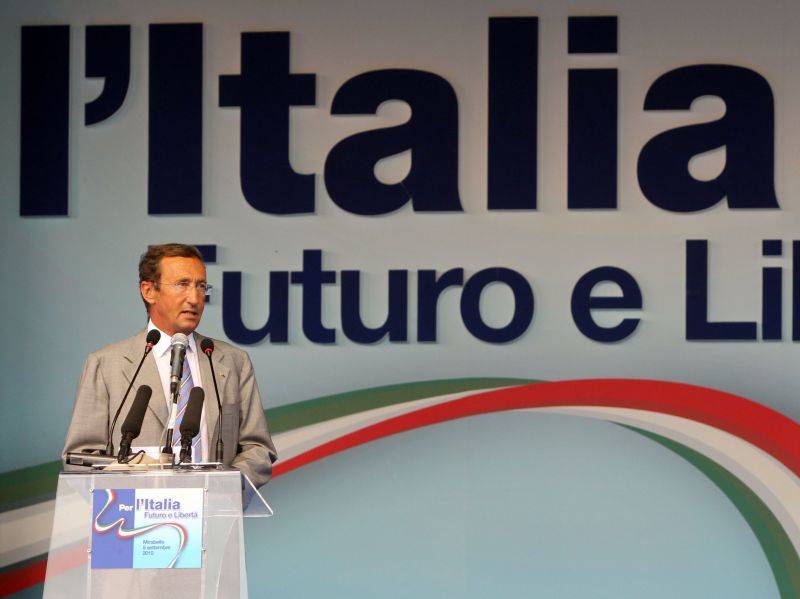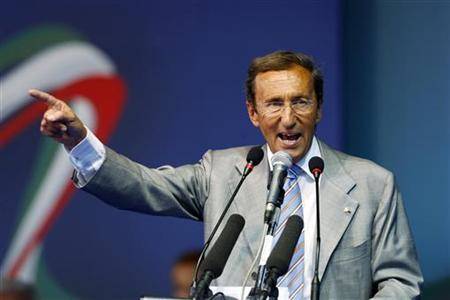Italian Politicians Lose Their Cool (and Slip in the Polls)
In the past year Italy’s political language—its Politichese, a play on the word Inglese (English)—has taken on the nastiness of a slumland playground: “Liar!” “Bossy boots!” “Thief!” This week the tone went ballistic. A few weeks ago Premier Silvio Berlusconi kicked out of the Popolo della Libertà (PdL) its co-founder with him, the president of the Chamber of Deputies, Gianfranco Fini. On Sunday Fini responded in a much-awaited speech at Mirabello, in which he formally divorced Berlusconi’s group in Parliament and invited his supporting members there to join him in forming a new grouping. This is being seen as the first step toward creating a new and “normal” conservative political party in opposition to Berlusconi’s. As the able commentator Gianfranco Pasquino remarked Monday, “It was a brilliant speech,” and in it Fini particularly assailed Berlusconi’s penchant for considering the government a personal feifdom.
By way of reply, Berlusconi minions accused Fini of conducting “guerrilla warfare” and of turning the PdL, which Fini and Berlusconi had co-founded exactly eighteen months ago, into a “Vietnam”-style battleground.
Italian politicians rarely shy away from shouting down opponents and hurling invectives, especially when on TV, but this time their attitudes too betrayed serious concern. Speaking to his own party backers last month, Berlusconi, usually the smoothest of ad libers, stumbled over words as he tensely read from an eight-page diktat. When Fini finished his j’accuse against Berlusconi-style autocratic rule and “Stalinist” tactics of personal attacks on Fini’s family, observers reported that Fini was literally trembling with emotion. Politicians from other parties were no less exercised. While giving a speech Pier Ferdinando Casini, 55, who speaks for Catholic centrist voters, agitated his arms as if he were announcing Armageddon.
The one who lost his cool least was Umberto Bossi, 69, visibly licking his chops because—more than Berlusconi’s PdL—the Northern League which Bossi heads, and which backs Berlusconi in government, continues to gain consensus among voters. Another relatively cool customer was a spoiler on the moderate left, former magistrate Antonio Di Pietro, 60, whose small Italia dei Valori party (with about 4%), takes a staunch stance against organized crime and attracts young people. That party too may make some gains should early elections be called.
So will they be called three years ahead of schedule? Before this is decided, the most likely first step is for Berlusconi to call upon the Italian President in coming days to insist that Fini be removed as President of the Parliament, on grounds that Fini was put there by the Berlusconi coalition for which Fini no longer speaks and his presence there is no longer “compatible,” to quote from a joint Bossi-Berlusconi statement issued Tuesday. The situation, says the statement, is “very serious [and] raises serious problems for the regular functioning of the institutions.”
Bossi is openly campaigning for elections in late November. Berlusconi too now seems to agree, truculently in public, reluctantly in private, that the legislature elected only two years ago is beyond salvaging. The Italian Constitution puts the decision to call new elections in the hands of President Giorgio Napolitano, but if and when the Berlusconi government succumbs in a vote of confidence, Napolitano will have to take action. The conventional wisdom here is that the longer Berlusconi waits, the more votes he is likely to lose to Fini. But Napolitano has the option of appointing a caretaker cabinet, perhaps headed by a Berlusconi rival in the PdL, Finance Minister Giulio Tremonti, 63.
As the parties gear up for the possibility of elections in late Autumn or early Spring, eyes naturally turn to the polls, but these are tricky. According to Euromedia Research, as reported in the pro-Berlusconi Il Giornale (it is owned by Berlusconi’s brother Paolo), a poll of 1,000 (presumably) representative individuals suggests that a brand new Fini party would, on its own, obtain only from 1% to 3%. Were a Fini party to face voters in a coalition of center-left parties, according to this poll, it would receive no more than 2% of the vote, or quite possibly too few to make it into Parliament, for which a 2% minimum is necessary.
At the same time, another poll—this one by IPR Marketing and reported in the opposition newspaper La Repubblica—suggests that all the parties are looking like losers. Since last summer Berlusconi has shed 10% of his popularity, which now stands at no more than 50%, or one out of two potential voters. He remains popular among white-collar employees, young people and small-towns citizens, for whom TV viewing is more important than it is in urban centers. But among middle class, educated voters his personal popularity has sunk from 43% to under 30%, with the biggest losses in the South, where voters resent Berlusconi’s concessions to Bossi’s Northern League. In particular, voters with a high education level, once 40% in favor of Berlusconi, now give him only 28%.
On the other hand, does this matter? Put another way, which is the tea party, Berlusconi with his know-nothings, or the more elitarian Fini? And at any rate predictions of elections in November may be premature, for the politicians know that, the more time passes, the more the greater the disenchantment with the political class. Voters may simply stay away from the polls in droves, and, no matter what the pollsters say now, anything can happen. This awareness is acting as a brake on both Berlusconi and Fini. For despite the battlefield war room tone, both are still cautiously raising, if not white flags, at least white hankies to each other. Fini, after all, has not yet announced that he is forming a new political party—just a Parliamentary group called “Futuro e Libertà”, already dubbed the “Futuristi”. And Berlusconi would rather not turn the vestiges of his old party, Forza Italia (the “Forzisti”) over to Bossi, lock, stock and barrel. Berlusconi fared best when mediating between the two, one representing the disgruntled populist North, the other the state-dependent South. In a peculiar way, Berlusconi was a unifying force.
In short, Berlusconi still needs Fini, and Fini still needs Berlusconi, if Fini is not to disappear into the woodwork.








































i-Italy
Facebook
Google+
This work may not be reproduced, in whole or in part, without prior written permission.
Questo lavoro non può essere riprodotto, in tutto o in parte, senza permesso scritto.